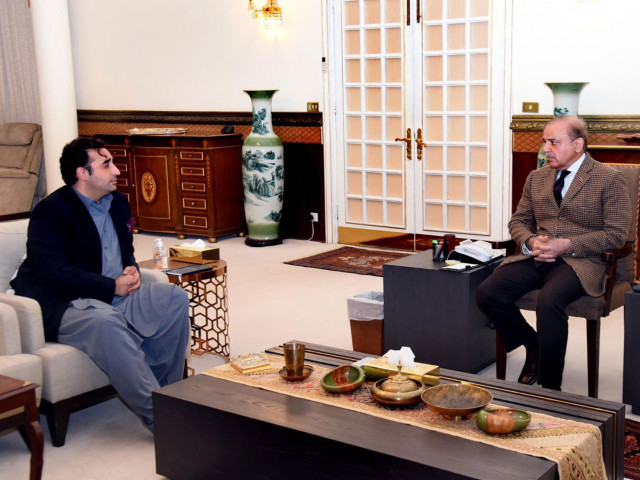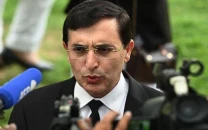PML-N, PPP agree on 18% increase in defence spending
Bilawal-led delegation meets PM to discuss next budget

The federal government on Monday shared roughly Rs17.5 trillion worth of new budget framework with its key allythe Pakistan Peoples Partywhich endorsed an 18% increase in defence spending due to tensions with India but termed the development allocation insufficient.
Like this year, the government is planning to unveil a fiscally-tight stabilisation budget, which is being constructed around a very high primary surplus target, according to a briefing given to the PPP delegation, led by Bilawal Bhutto Zardari.
The PPP, which is providing crucial support to the government in the National Assembly, met with Prime Minister Shehbaz Sharif and his economic team to discuss the budget matters.
The size of the budget is lower than Rs18 trillion, which is less than this year's budget due to steep reduction in the interest expense on the back of an 11% cut in policy rate by the central bank.
However, there was a consensus between the PML-N and the PPP to increase the defense budget due to the recent wave of tensions with India, said the sources. They said that the PPP backed the proposal to increase the defense budget by 18% to over Rs2.5 trillion in the light of the prevailing security threats.
Both parties were having divergent views on the next fiscal year's Public Sector Development Programme. The government has proposed Rs1 trillion PSDP; however, the PPP asked for a larger allocation.
For this fiscal year, Rs1.1 trillion had been allocated but spending fell far behind the allocation. One of the participants suggested setting the PSDP at this year's actual spending level, which will be significantly lower than the Rs1 trillion proposed allocation.
Planning Minister Ahsan Iqbal declined to comment on the PPP's reservation about low development budget allocation.
The government is planning to maintain fiscal discipline and create a primary budget surplus double than this fiscal year as part of its understanding with the IMF to lower debt burden.
Prime Minister Shehbaz Sharif constituted a committee under the chairmanship of Deputy Prime Minister Ishaq Dar to build a consensus between the PPP and the PML-N on the next budget. The budget will be presented in the National Assembly before Eid holidays.
Pensions might be increased by 7% and salaries at this stage are proposed to be raised only 6% aimed at meeting the IMF demand of keeping the employees-related expenditures frozen at this year's level in terms of the size of the economy.
However, both the proposed increases may go up from the 6% and 7% levels, said the sources. The average inflation is expected to remain around 5% and the government has linked the increase in salaries with inflation rate.
Some members of the PPP delegation also termed the next fiscal year's proposed Rs14.3 trillion tax target unrealistic due to a slowing economy, squeeze being faced by the businesses and negative growth in the large scale manufacturing, said the sources.
The PPP also asked the government to prioritise sectors that need to be protected and promoted to get economic growth. It advised the government not to take any adverse measures that can hurt the agriculture sector, said the sources.
The PPP also sought tax relief for the salaried class, which was adversely affected by the heavy taxation in the last budget.
The sources told The Express Tribune that the government may impose income tax on high-end pensioners but is considering providing some relief to the marginalized salaried persons by enhancing their tax exemption threshold and also lowering rates against various slabs.
There are proposals to introduce income tax on pensioners and at the same time reduce the rates for the salaried class, subject to the clearance by the IMF later this month, according to a top official of the Federal Board of Revenue.
According to these discussions, the current tax-free monthly salary limit may be enhanced from Rs50,000 to little over Rs83,000. Due to progressivity in the slabs, its benefit will also be available to the people earning higher income. The discussions are also taking place to reduce 2.5% income tax rate against all the existing slab rates. This will effectively reduce the overall effective income tax rate by 3%, said the officials.
The income levels against each slab rate are also being recommended to be increased to reduce the burden, said the sources.
The salaried class had been hit the hardest in the last budget by the government of Prime Minister Shehbaz Sharif. The government has slapped a 35% tax on monthly income of over Rs333,000, which might be reduced by 2.5% in addition to increasing the tax-free threshold.
The 5% tax rate on a monthly income of Rs100,000 had been imposed, which also might be downward adjusted. On a monthly income of Rs183,000, the government had slapped 15% income tax, which could be cut to 12.5%.
On monthly income of over Rs267,000, the government charges 25% income tax, which could be reduced to 22.5%. There is also a recommendation to introduce a new slab at 20% rate but this may not pass through the IMF scrutiny that is not in favour of having more than four slabs.
On monthly income of up to Rs333,000, the tax rate is 30%, which could be lowered to 27.5%.
The government should give relief to the salaried class and go after traders, said PML-N Senator Anusha Rehman on Monday.
According to The Express Tribune report, the salaried class paid Rs391 billion income tax in just nine months, which was equal to 10% of the total income tax paid by the entire Pakistan. The traders paid only Rs26 billion, just 0.6% of the total income tax collection.
The top FBR official said that the pension was a source of income, which has to be taxed. The proposal to tax pensions had also been floated last year but subsequently it was shelved. The consideration is that compared to normal salaried income, the level of taxation of the pensions should be at least four times less.
As against the current monthly tax-free income level of Rs50,000, the authorities want to tax the pensions of over Rs200,000 per month. If approved, this would hit only the high-end pensioners, mostly retired judges, three-star generals and retired grade 21-22 bureaucrats.
For the next fiscal year, the government is planning to set a tax target of Rs14.3 trillion. This is Rs2 trillion or 16% higher than this year's downward revised target. The government expects that Rs1.5 trillion or 12% additional collection will come due to nominal increase in the size of the economy.
However, the IMF is asking the FBR to finalise proposals for collecting the additional 4% or over Rs500 billion taxes, according to the sources.
The sources said that the FBR's enforcement has strengthened, which is evident from 26% annual growth in collection despite 7% nominal economic growth. They believed that the government did not need any measure but the Fund was asking to take measures.
Meanwhile, the Senate Standing Committee on Finance on Monday heard the budget related demands of various businesses.
The poultry association disclosed that the FBR was charging Rs5,190 tax on a parent-chicken, which was abnormally high. FBR Chairman Rashid Langrial assured to review the issue before the budget.
The Pakistan Dairy Association has demanded again to reduce the sales tax on packaged milk to 5% from the world's highest rate of 18%, as the tax imposed last year has adversely affected the sales. Rashid Langrial told the committee that three proposals were being discussed to reduce the rate to 5%, 10% or 15% but no decision has been taken.
FBR (member) Tax Policy Dr Najeeb Memon said that the reduction in sales tax rate to 5% would dent revenues by Rs20 billion to Rs30 billion. The association was of the view that with sales going down, the FBR was already not achieving the desired results.
The Fruit Juices Council representative Atika Mir recommended lowering the federal excise duty rates to 15% from current 20%, as the heavy taxation has cumulatively reduced the companies' sales by 45% in the past two years. She said that the higher taxation also impacted the farmers due to a 66% reduction in demand for mangoes for making juices.
The government, which is facing a huge shortfall, on Saturday took an extraordinary measure and promulgated a Presidential Ordinance to immediately recover taxes from bank accounts of taxpayers after decisions by high courts and Supreme Court of Pakistan.
Prime Minister Shehbaz Sharif on Monday directed the Ministry of Information to inform the public about the true perspective of bringing the ordinance.





















COMMENTS
Comments are moderated and generally will be posted if they are on-topic and not abusive.
For more information, please see our Comments FAQ